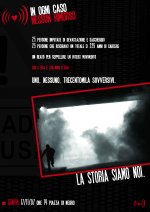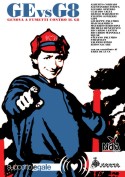

astasiempre - l'asta
Cerca
Navigazione
GLF e Segreteria Legale
[Press release] Please do
Torture, threaten, trample and crush the rights of the people, particularly if you belong to the forces of law and order, and they are demonstrators: in this country, that's a "nothing" crime. In contrast, breaking a window is one of the most serious crimes anyone could be possessed to do. The people are nothing. "Stuff" is everything. That is the moral that emerges from the Genoa trials.
Despite the Prosecuting Judge's denunciation of the violence and the torture that came down inside the Bolzaneto barracks during the days of the G8 in 2001, the penalties for 15 of the 45 officers investigated are slight. Few and light were the requests, and even fewer and lighter were the sentences. We could not have expected any more than this. We could not have expected any less than this, from courts in a country in which torture itself is not legally recognized as a crime; it's on the books, of course, but not considered an abuse of power against those upon whom it is inflicted: it is only mentioned as a procedural matter within the court system.
So according to the courts, at Bolzaneto, nothing happened, or almost nothing. No gratuitous violence and no violation of the International Convention for Human Rights. A verdict that was necessary, but not sufficient for the 209 civil plaintiffs to be compensated. A sentence that is, for all that, piteous, because it validates the tired old theory of "a few rotten apples". The few and slight sentences are handed down to the 15 remaining guilty parties, among whom we find the already-condemned Perugini and Guliotta, the authorities who were responsible for the barracks penitentiary. The charges left standing after so many years are generic abuses of authority in a few specific and individual circumstances, which explains the reasoning behind the "moderate convictions."
So the curtain falls, for now, on this trial that will be suspended by the statute of limitations in 2009. The truth that has emerged from the testimony of the victims of Bolzaneto is only partially recognized: it is difficult to deny all the evidence that comes to light just a few months after the sentence for the other great trial against the forces of law and order, the trial of the Diaz School raid. But certainly, what this verdict tells us is that torture is only a procedural abuse of authority, and therefore, why shouldn't the Diaz School raid be simply read as a reasonable search, the tranquil exercise of due process of law? This is a pessimistic view, but it was already understood.
La Storia Siamo Noi




